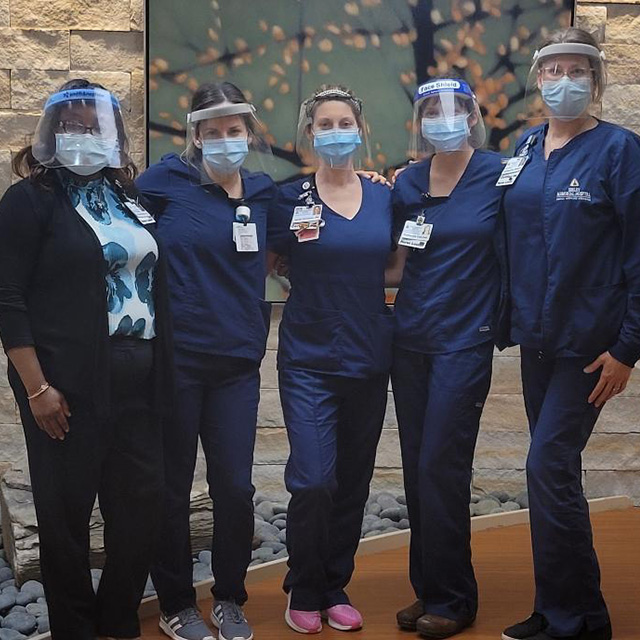Martece Yates, B.S.N., R.N., reaches out to her patients to introduce herself as soon as possible after they’ve been referred to a maternal and fetal medicine specialist. She stays in touch with them from that point forward, helping with paperwork, periodically checking in on them and connecting them with any services and support they need.
This hands-on, personal approach is a key part of the Maternal Health Access Program at Sibley Memorial Hospital. Thanks to a generous philanthropic investment by the A. James & Alice B. Clark Foundation, the program expanded early identification of high-risk women, established a clinical care coordination program and developed innovative methods to monitor pregnancy with the goal of improving both maternal and neonatal outcomes in the District of Columbia.
That’s where Yates comes in. As the high-risk patient care and outreach nurse navigator, she makes connections and creates relationships built on trust and respect from the first time she meets a new patient, all with the goal of keeping patients as safe as possible during and after their pregnancies.
Both Yates and case coordinator Emily Weiss, M.P.H., B.S.N., R.N., were nurses in Sibley’s Family Centered Care Unit (FCCU), caring for new mothers and their newborns. Weiss says that the postpartum nurse’s perspective is a very holistic one and having that knowledge and experience is key to their success in caring for the families they serve now. “As mother and baby nurses, we really form a relationship with our patients, even if they are only here for a few days. We learn how families interact and see their social situations. This perspective helps us look at the whole patient, not just their medical needs,” Weiss says.
They don’t always have the chance to meet their patients from the Maternal Health Access Program beforehand. Sometimes a mother arrives in the Emergency Department already in labor with no health insurance and suffering from depression, for example. Once they are in the hospital, Weiss can work with patients to make sure they have what they need before discharge — including mental health support.
Or, the team may meet someone with a broad range of needs — as in the case of a full-term pregnant refugee with low fetal birth weight who left all her belongings and her family in her home country as she fled for safety. No matter the circumstances, the Maternal Health Access Program team provides the support or makes the connections to get patients the resources they need — clinical or not.
The team has built strong connections with community organizations who can help their patients, too. They’ve partnered with the District of Columbia Department of Transportation so every baby goes home in a safe car seat. And, they work closely with organizations that provide support and resources after a mother suffers a devastating loss, such as stillbirth or miscarriage.
What they learn from their patients helps them eliminate barriers to care for future patients across the health care system. After seeing many women experiencing mental health crises, they’ve raised awareness and education about postpartum depression among the staff at Sibley. Their work has led to the implementation of postpartum depression screening tools in every inpatient setting at the hospital.
They are also helping Sibley successfully face difficult conversations in nursing head-on, including leading important dialogue about how bias can impact the equity of care delivered to the people who need that care the most. They talk openly about how every care provider should be aware of bias and how it may impact their own actions. This is especially critical when caring for people who have a history of being underserved. Many of these patients have already experienced bias from health care providers — and those previous experiences can prevent them from seeking the care they need or from trusting the people who provide that care.
Yates says her own personal history helps her understand her patients. “I’m a Washingtonian and grew up in this area with stories similar to some of these patients,” says Yates. “I know what it's like trying to navigate health care, while young and pregnant, being judged unfairly.
“It’s important for us to provide equitable care and make sure we provide the best care to everyone.”

